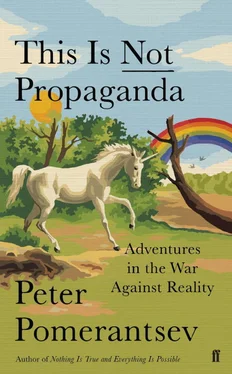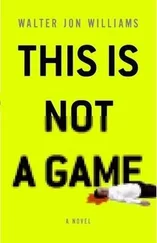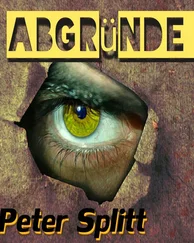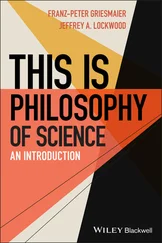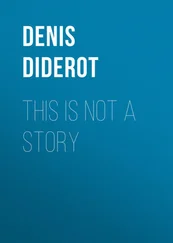From there we drove to the village of Lobachevo, a collection of single-storey wooden houses at skewed angles. A cow stood on the road, staring at an outhouse. Three elderly men in dusty string vests, flip-flops on dirty feet, sat drinking and smoking on some logs outside. One of them, known as Uncle Kolya, had no teeth. He claimed a separatist had knocked them out after he refused to sing the Luhansk People’s Republic anthem. The soldiers suspected he had concocted the story just for them, and that the second their backs were turned he would curse Ukraine. ‘We spent a long time winning their trust,’ said the ComBrig. ‘At first they thought we were all Pravy Sektor monsters from the Russian propaganda machine.’
Across the riverbank you could see the separatists with rifles slung over their shoulders, pacing up and down by the old ferry station. The ferry had been blown up during the fighting. Families who lived on different sides of the river had been split. The school was on one side and the shops were on the other. Local women crossed in a tiny rowboat with a tiny motor. They complained that if they carried more than one bag of potatoes, they could be done for smuggling contraband. They didn’t care about Ukraine, Russia or the Luhansk People’s Republic. They cared about their village, and their potatoes.
We drove out from Lobachevo, past abandoned churches and blown-up bridges that had collapsed into the green river, past women walking with goats. There was no obvious profit to be made from any of this land. Kiev had done nothing to develop it in twenty years of independence, but the Kremlin had little need for it either. If you looked closely, both sides were prepared to lose Luhanschina: the Kremlin wanted to hand it back to Ukraine while maintaining covert political control; Kiev made noises about ‘unity’, but many people, from top brass to academics, argued that the best outcome was a frozen territory the Kremlin had to fund and feed.
War used to be about capturing territory and planting flags, but something different was at play out here. Moscow needed to create a narrative about how pro-democracy revolutions like the Maidan led to chaos and civil war. Kiev needed to show that separatism leads to misery. What actually happened on the ground was almost irrelevant; the two governments just needed enough footage to back their respective stories. Propaganda has always accompanied war, usually as a handmaiden to the actual fighting. But the information age means that this equation has been flipped: military operations are now handmaidens to the more important information effect. It would be like a heavily scripted reality-TV show if it weren’t for the very real deaths. A few months after my visit, on 3 November 2015, the Kharkiv 92nd would be caught up in a firefight by Lobachevo. The ComBrig was wounded, but survived.
Our vehicles stopped by a bend in the river. The soldiers took off their donated uniforms, grabbed a Tarzan swing that drooped from a tree on the bank and leapt into the water, whooping. Some tried backflips and others bellyflopped: this was a daily ritual to help them wind down after the patrol.
The ComBrig was in the river when his phone went off. It was an emergency: shelling had started again over no-man’s-land. The previous day the 92nd had agreed on a ceasefire with the separatists so that electricians could come into the firing zone and fix some cables. Now the separatists were shelling overhead. If the 92nd fired back, it would look like they were firing on civilians. ‘Whatever you do, don’t react,’ said the ComBrig, fatigues hurriedly pulled over wet boxer shorts. ‘It’s a provocation for the cameras.’
In the evening we drank moonshine cognac from a plastic bottle and looked up at the stars, as thick as grapes, listening for the sound of shells and following traces of missiles in the sky. We were looking for signs of our military fate, like medieval men had looked at comets in search of meaning. Some of the stars moved around: drones, spying on us. I felt as though I were inside a modern icon: the information war had broken so much of my sense of scale. The activists behind their laptops seemed as big as ministries; mythological fiends from Twitter as real as tanks. The borders between Russia and Ukraine, between past and present, between soldier and civilian, rumour and evidence, actor and audience had buckled, and with that the whole rational, ordered sense of perspective suddenly gave way to a thinking that was magical and mystical, where reality was unknowable and seemed to be decided somewhere up on high by divine conspiracies. The layers of spheres and angels had been replaced with endlessly reflecting media stories, where information was no longer simply the recording of action but the point of it. We were all caught up in the recordings, revolving and refracting in the information heavens.
A drone paused up above us.
‘Smile,’ said the ComBrig. ‘It’s taking your photo.’
I had my first fact-check in my first year of primary school. I was three when I arrived in London. Playing football was my only way of communicating when I went to school; watching football on TV was my way into the language. Football commentary, which matches words to action, was a way to learn vocabulary. I learnt to read English from children’s football magazines.
Between four and seven I spoke semi-English. I only half understood the people around me, and could only part communicate. I spent a lot of time in my head. I would compose football games in my mind, commentating on them in my handicapped English. I invented teams. I described the players’ lives and moods in detail in the commentary. The players got older and had problems. They switched teams and were reinvigorated. I made up leagues. I kept pads with all my teams and the scores from games written down in them. I made up national squads. I spent my pocket money on cups from the local sports shop to present to the imaginary teams. I was a player too in this imagined world, and after many knock-backs I made it into the England side. But I used myself sparingly, often as a substitute; I preferred commentating on the others.
At school once I blurted out that I was off to Montevideo to play in a tournament (I had just discovered Uruguay on a map). My teacher, Mrs Stern, called my parents and asked if I needed time off school for my trip to Uruguay. They told her there was no trip. The next day she asked me to stay behind after class. I’d never been held after class before and I knew it was important. ‘So it turns out everything you told us about going to Uruguay, about you playing football, was a fib,’ Mrs Stern said. From her tone I could tell I had done something wrong, but the problem was I didn’t know what the word ‘fib’ meant. Back home I looked it up. It didn’t seem right. I hadn’t thought of my imaginary world as a lie, just a parallel reality, and the one reality had spilled into the other.
By that time I was seven, it was 1984, and my English was improving. I had trained it up in the linguistic playing fields of my invented football universe. With the word ‘fib’ everything seemed to slot into place: I now had two words for the same thing (‘lie’ and ‘fib’) and it felt as if I had crossed a border into knowing English. The shock of people thinking I’d lied snapped me out of living so intensely in my imagination. Clearly this was not how to progress into acceptability.
In the early 1980s Lina had a job teaching Russian at London University. This too had its struggles. The other academics told her: ‘Of course you were opposed to the Soviet regime. It was because you were dissidents! You can’t be objective about it.’
‘No,’ she would try to explain, ‘it’s because of the objective nature of the regime we became dissidents…’ They seemed bemused by this. They were nice but they weren’t sure she was unbiased.
Читать дальше
